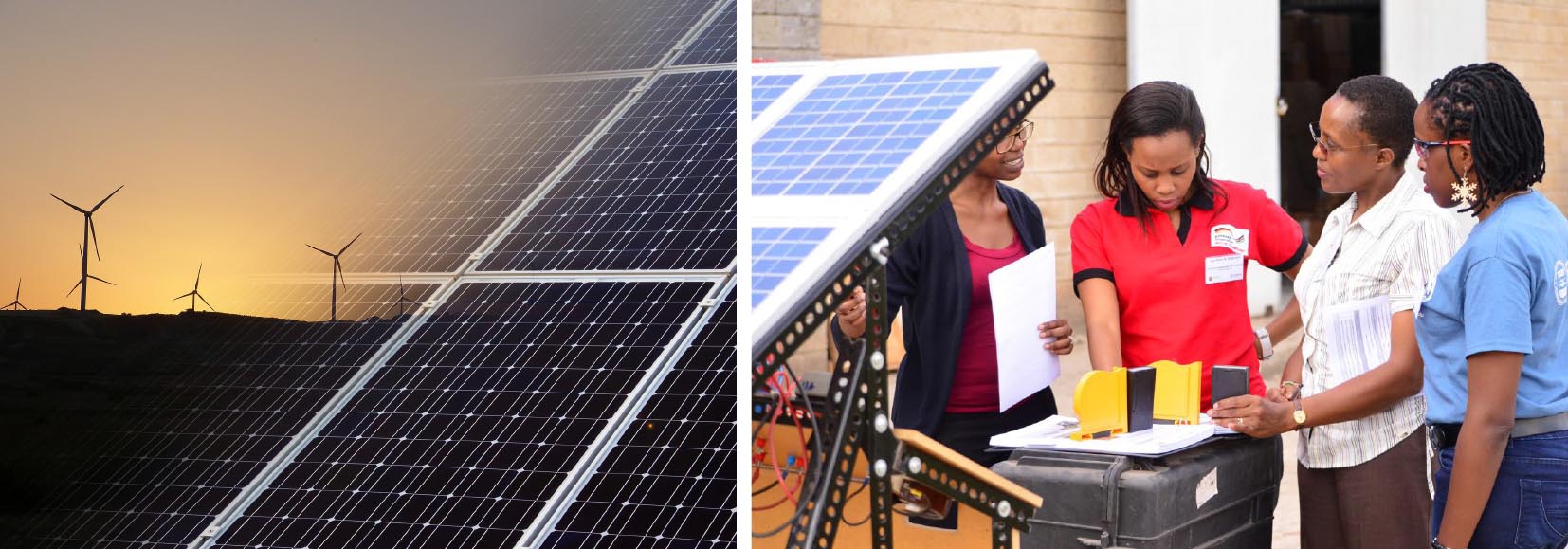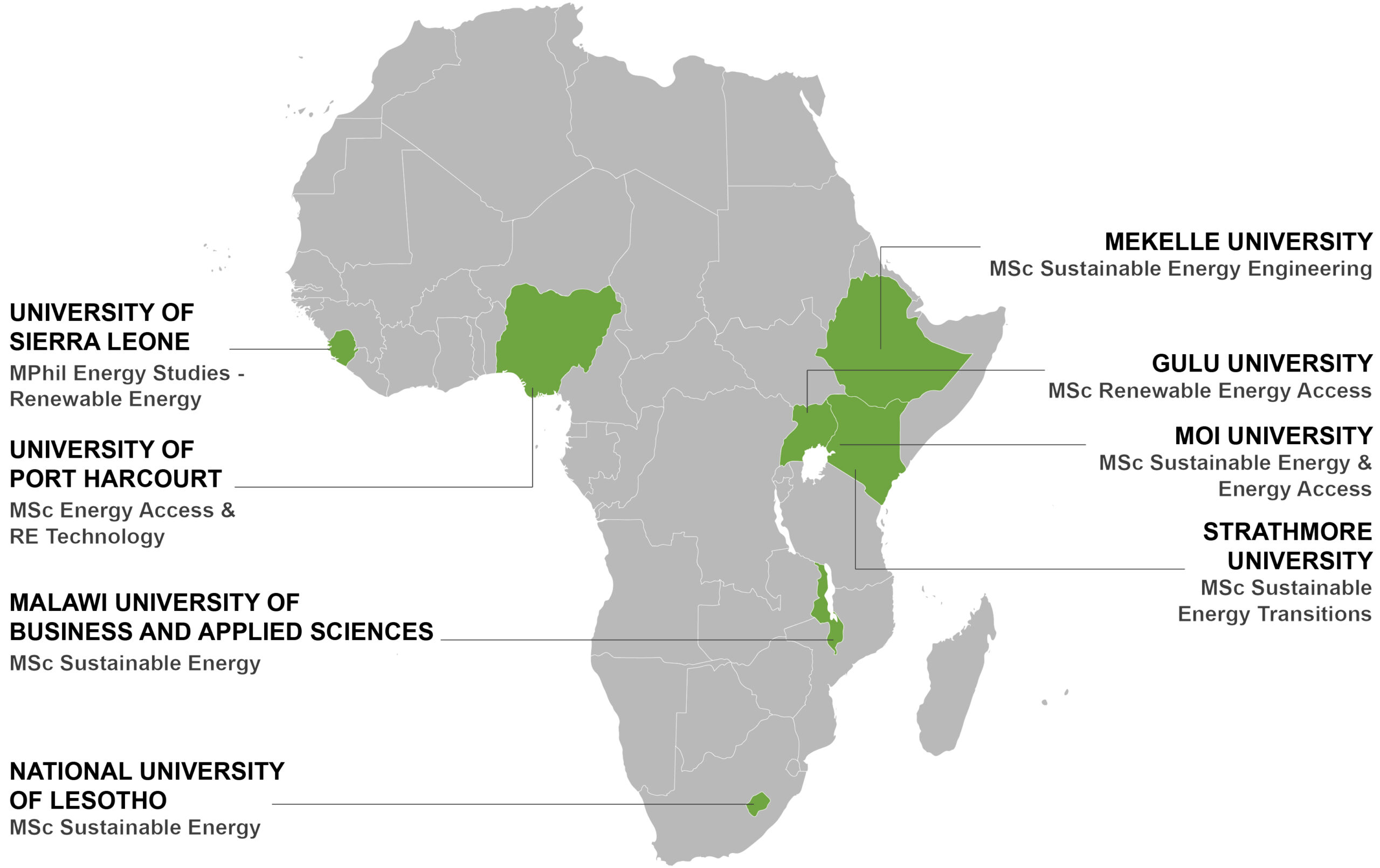The Liechtenstein REED Scholarships
Liechtenstein Renewable Energy Enterprise Development (REED) & Women in Renewable Energy Access Scholarship Programs

The Liechtenstein Renewable Energy Enterprise (REED) program provides monitored scholarships, supporting living expenses for students in renewable energy development and access programs across Africa, with a special emphasis on supporting women’s development in renewable energy.
The women in renewable energy access scholarship program is focused on emerging female scholars and practitioners to help with additional support in thesis and project based early career development.
-
Countries, cities and rural regions across Africa experience dramatic environmental, economic, and social changes. Strong local and distributed renewable energy supplies are key to sustainable economic and community development, good public health, poverty alleviation, grassroots business development, economic resiliency and climate change response. Due to the growing need in this vital sector, a rapidly widening gap in the availability of human resources has emerged. The demand for African experts and entrepreneurs with both technical and entrepreneurial skills has long outstripped supply, given the speed of energy development across Africa. African women are especially in need of support in traditionally male dominated engineering and business domains.
By nurturing training and educational programs across Africa via scholarship programs, LISD seeks to address the skills and professional shortage within the renewable energy development sector and its associated industries across the continent. Special emphasis is placed on local sustainable development projects that are driven by locally trained graduates nurtured by local academic and private sector institutions. By focusing strictly on local and national support we hope to lower the risk of brain drain and strengthen local institutions, industries and professionals.
LISD believes that the most affordable, direct and effective way to pursue these goals is to support the living costs for qualified students, to strengthen their ability to attend and successfully complete the university programs, and to encourage local project development through thesis requirements.
LISD established the REED Scholarships by identifying a pan-African support program that was developed through the UK Department for International Development funded Transforming Energy Access Learning Partnership (TEA-LP) program. The organisation has selected and supported eight African universities in the development of post-graduate curricula for sustainable energy access across Africa.
The resulting REED Scholarship program provides effective leverage through efficient and direct cost of living support. Initiated, designed, developed and managed by LISD, the scholarship program has since attracted important seed support by the Government of Liechtenstein, Liechtenstein public-benefit resources, and UK Department of International Development and UK Carbon Trust funds assigned via the University of Cape Town’s African Climate & Development Institute and its Energy Access – Learning Partnership.
Thirty young women and men across Ethiopia, Kenya, Lesotho, Malawi, Nigeria and Uganda are firmly committed scholarship recipients for 2021 through 2023, with more than half of them already studying. We now develop the financial perspective of our next group of recipients for their 2022 to 2024 studies.
LISD believes that the most affordable, direct and effective way to pursue these goals is to support the living costs for qualified students, to strengthen their ability to attend and successfully complete the university programs, and to encourage local project development through thesis requirements. -
Enable master studies by qualified candidates in renewable energy access, and thereby increase the number of African graduates in sustainable development.
Support the viability of these new university programs by lowering the hurdle of enrolment for underprivileged yet qualified candidates.
Support women in promising thesis and other community projects as early career bridging measures.
-
Structured support during the scholarship’s initial phase through 2026 help the energy access programs become known and respected, and attract additional scholarship funding and/or fee-paying students. Grants tapered off towards the end of the first cycle encourage universities to find alternative funds.
Scholarships are awarded not only on the basis of financial need, academic excellence, but also commitment to community renewable energy access in the country as well as contribution to cultural and social diversity goals. Selection takes into account gender equal access principles, as well as personal character, communication ability, community involvement, alignment with renewable energy access aims, and leadership promise.
Program features:- bi-annual progress reporting by students and supervisors;
- monitoring, evaluation and review of the new energy access programs; and
- special support for practical energy application thesis projects.
-
For more information on the scholarship
Professor Peter Droege
UNIVERSITY PARTNERS

The program is supported by the Government of Liechtenstein within context of the Transforming Energy Access Learning Partnership (TEA-LP) program currently in action across selected universities across Africa, and in keeping with a number of UN Sustainable Development Goals – in particular #7: affordable and clean energy for all.
LISD is dedicated to the integration and proliferation of renewable energy in infrastructure, urban and regional development internationally. Its scholarship is supported by the Government of Liechtenstein’s international development program.
TEA-LP aims to build the human capital to increase access to sustainable energy across Africa, South East Asia and the Indo Pacific. It is funded by UK Aid, and supports 30 universities in the delivery of Masters’ curricula for sustainable energy access.

